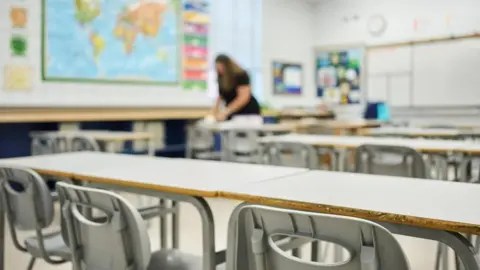‘Toxic’ phone use impacting ‘struggling’ students, study finds

‘Toxic’ phone use impacting ‘struggling’ students, study finds




A survey of thousands of pupils, teachers and parents has found struggling students are more likely to come into contact with potentially harmful content on their phones compared to their better performing peers.
The University of the West of England study found pupils who categorised themselves as struggling academically were at greater risk of seeing content on topics like self harm.
It also found parents underestimated the types of harmful content their children were viewing and that there was support for stricter rules on phones in schools.
Researchers found “toxic” aspects of smartphone use and said better conversations around the negative impacts of devices were needed.
The survey gathered the views of 3,721 secondary school pupils, more than 1,500 parents and 352 secondary teachers across schools in and around Bristol.
The experiences of pupils who said they were struggling were compared with those who said they were “coasting” or “thriving”.
Dr Ben Knight, from UWE Bristol’s School of Education and Childhood said struggling pupils were “particularly vulnerable to the most troubling dimensions of smartphone use”.
Dr Paul Redford, who co-authored the study alongside Dr Knight, said chat groups were the most “toxic element of smartphone use”.
He added that between 10-25% of pupils surveyed “reported having a wide range of negative experiences with their smartphones, from everyday upset arising from peer group squabbles to exposure to harmful and illegal content”.
The study also found a “disconnect” between parents concerns over smartphone use and the types of negative experiences reported by young people.
Parents were found to have overestimated the problems their children were experiencing around being upset, ignored or left out and underestimated the extent children were accessing “disturbing” content on self harm, suicide and eating disorders.
Dr Knight said the discrepancy could be down to what young people “are and are not sharing with their parents”.
“They could be thinking ‘If my parents or teachers were aware of the extent to which I’m seeing certain content, then maybe they take my phone away’,” he added.
Dr Redford added: “The overall picture is that there are much more serious negative things going on with young people and their smartphones than parents are aware of.”
Rules on smartphone use in schools revealed a split with teachers and parents views differing to pupils.
Half of the parents surveyed were found to prefer a stricter policy such as banning smartphones or keeping them locked in pouches. This was supported by more than a third of teachers.
In contrast, less than 7% of pupils surveyed thought stricter controls were necessary.
Dr Knight said the findings represented an “interesting paradox” in young people who are struggling but are most likely to resist restrictions on phone use.
The survey also highlighted several positive aspects of smartphone use among young people such as safety. than a third of parents said their child was safer on their commute to school with their phone and 80% of child respondents said they were safer with their phone.
Disclaimer: This news article has been republished exactly as it appeared on its original source, without any modification. We do not take any responsibility for its content, which remains solely the responsibility of the original publisher.
Author:
Published on: 2025-09-30 05:06:00
Source: www.bbc.com





